Looking back, pushing forward: WDFI Advocacy Hub year in review
The Women’s Digital Financial Inclusion (WDFI) Advocacy Hub emerged as a mechanism to build on the global momentum around gender equality and to accelerate the pace of change by bridging global commitments and local results.
Find out how a unified focus on advocacy is creating an environment where women can make an informed choice on their financial future and lift their communities and national economies in Ethiopia.
When we launched the Women’s Digital Financial Inclusion (WDFI) Advocacy Hub in Ethiopia in June 2022, we committed to:
Convene diverse stakeholders in Ethiopia to form a Coalition to advance women’s digital and financial inclusion
Support the members of this Coalition by facilitating access to trainings and insights, and channelling financial resources to make their ideas a reality
Elevate and amplify local voices and opening spaces for young, diverse, up-and-coming individuals to own and share calls to action at global platforms
How it started
The WDFI Advocacy Hub model is unique because it focuses on shifting resources to local partners, spurring a constructive dialogue with decision-makers, and bringing new voices to the fore.
The Hub is centred on three pillars that we have identified as key to harnessing digital technologies for advancing women’s financial inclusion:
Implementing the right policy and regulatory frameworks that enable innovative and inclusive digital financial services; and
Fostering regular and informed engagement between stakeholders and co-creating advocacy strategies that put women’s need at the forefront; and
Championing female leaders and advocating for more women to be in decision-making roles.
First activities: Launch in Addis Ababa
On 9th June 2022, the launch event of the WDFI Advocacy Hub in Ethiopia brought together over 120 decision-makers, digital and financial experts, as well as civil society organisations to begin to articulate a common vision to accelerate digital financial inclusion for women in Ethiopia.
The event included opening remarks from senior representatives from all sectors and a diverse panel moderated by a vibrant young female entrepreneur, Rahwa Gebremeskel, who brought her energy to the event.





How it’s going
Regular Coalition meetings with guest speakers
In July 2022, we announced the 16 members of the first cohort of the Ethiopia Coalition, who were selected from over 60 applications. The WDFI Hub Ethiopia Coalition held its inaugural meeting on 13th July, after which members met on a monthly basis. UNCDF invited global speakers to present insights and best practices on topics that Coalition members identified as relevant to them. Each session built on the next; starting with inclusive data, on to human-centred design, financial literacy, and ramping up to agent networks.
Bespoke training: Fletcher School Leadership Program for Financial Inclusion
In partnership with the Tufts University Fletcher School Leadership Program for Financial Inclusion (FLPFI), UNCDF coordinated the Eight Question Method (8QM) training to support the work of the Coalition to promote strong gender-inclusive financial ecosystems. The 8QM is a proven framework which guides attendees to develop an original project grounded on evidence that seeks to positively impact the livelihoods of the target group they chose to focus on.
“The participants did exceptional work collaboratively developing solutions during the 8QM training. Now, their ongoing interaction through the Ethiopia Coalition presents a unique opportunity for those ideas to mature and be implemented, and for cross-institutional relationships to strengthen further.”
For the first time, members of the Ethiopia Coalition were able to interact face-to-face and to work in multi-stakeholder teams to formulate solutions that empower women and improve their access to digital financial services. Over the five days of the training, the teams explored a wide range of barriers limiting women’s access to financial services and digital solutions, formulated and prioritized objectives and developed solutions. On the last day, the teams pitched these solutions to a panel of experts to get their feedback. These experts were Ms. Martha Hailemariam, Advisor to the Vice-Governor, Financial Institutions Supervision Cluster, NBE; Rahel Ali, Digital Finance and Gender Expert, BTCA, and Dr. Tapiwa Uchizi Nyasulu-Rweyemamu, Head of Gender Policy and Development Division.
Opening the training to a wide range of institutions and delivering as part of the activities of the WDFI Advocacy Hub proved crucial to ensure participants had a platform for continued engagement that would allow them to widen their perspective, further build and test their skills, as well as give them the opportunity to apply for funds to implement some of their original projects.
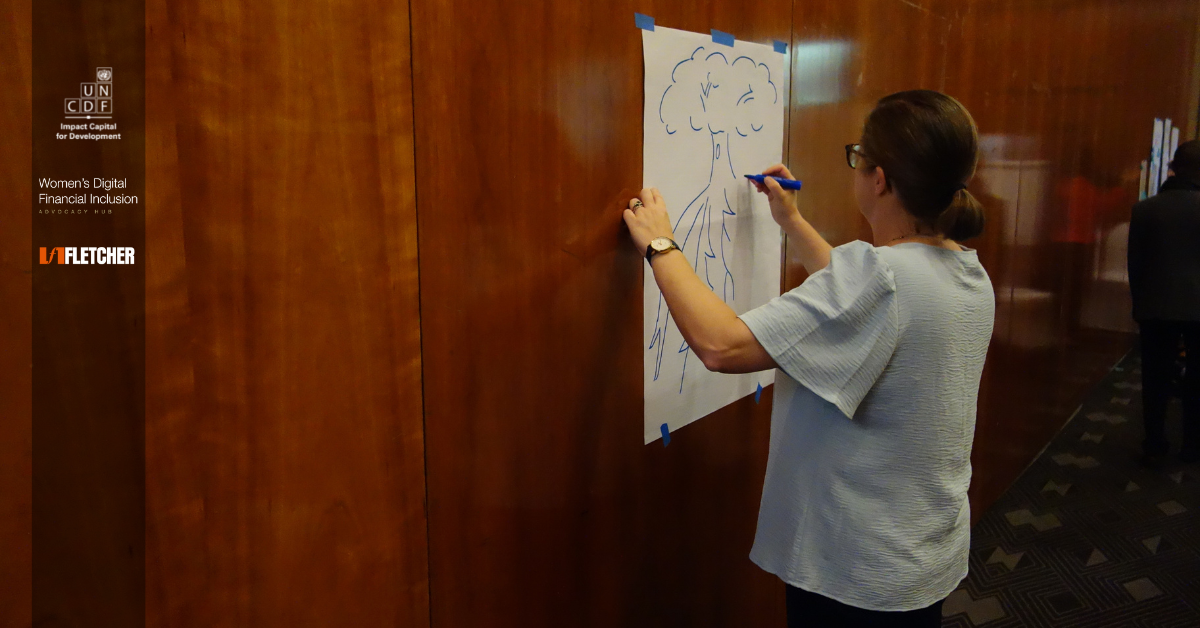
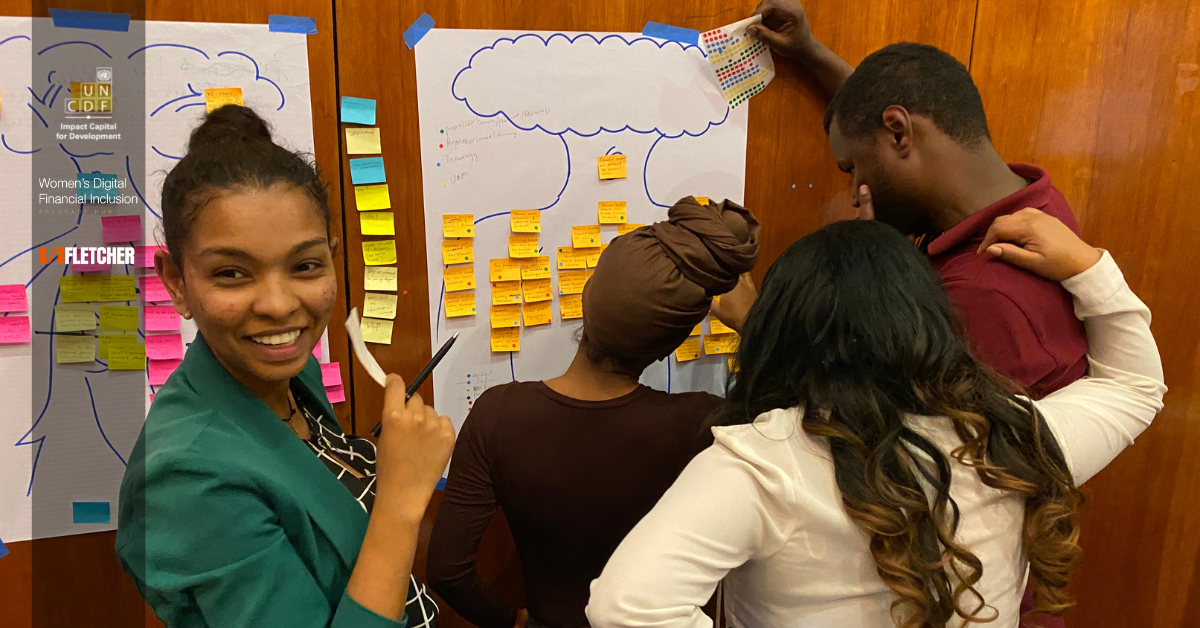

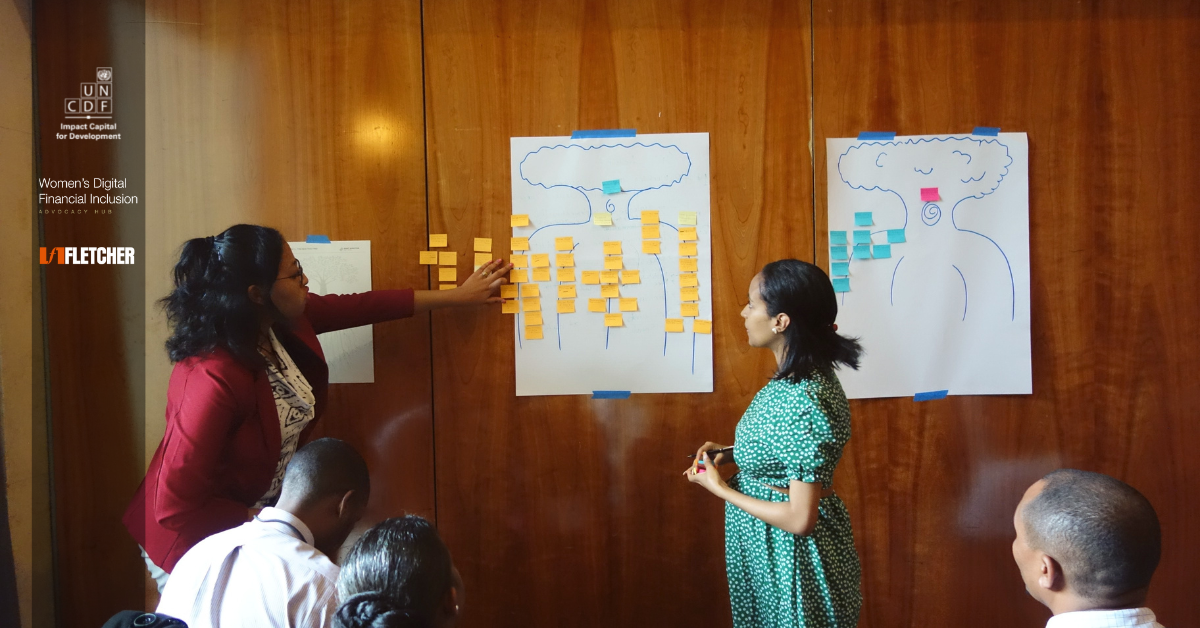
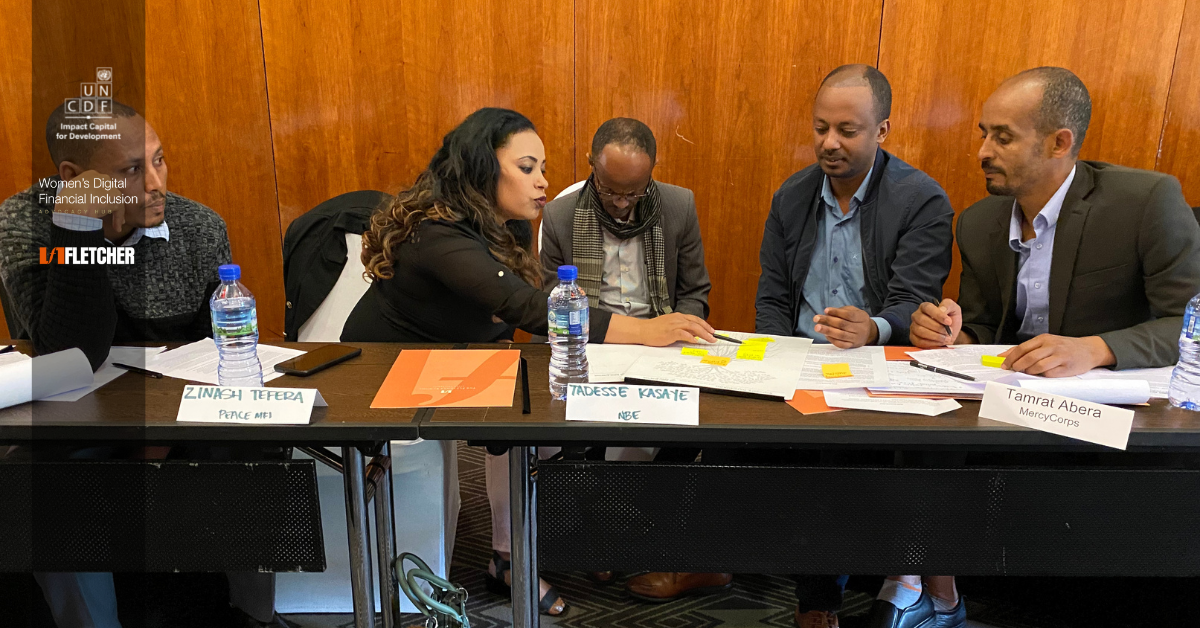
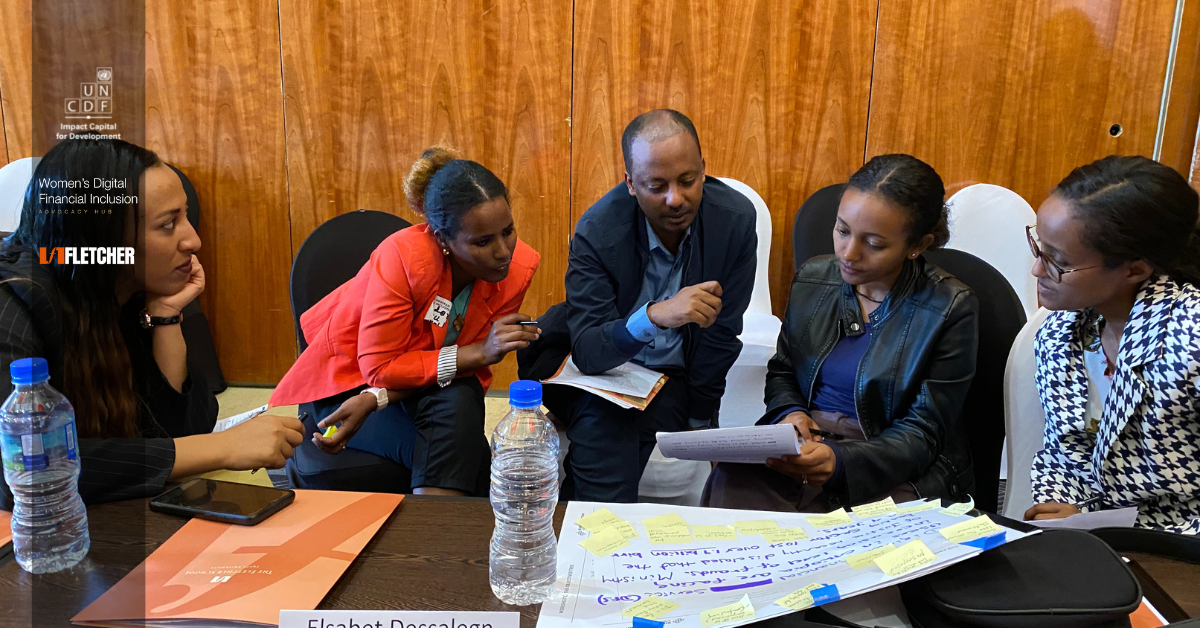
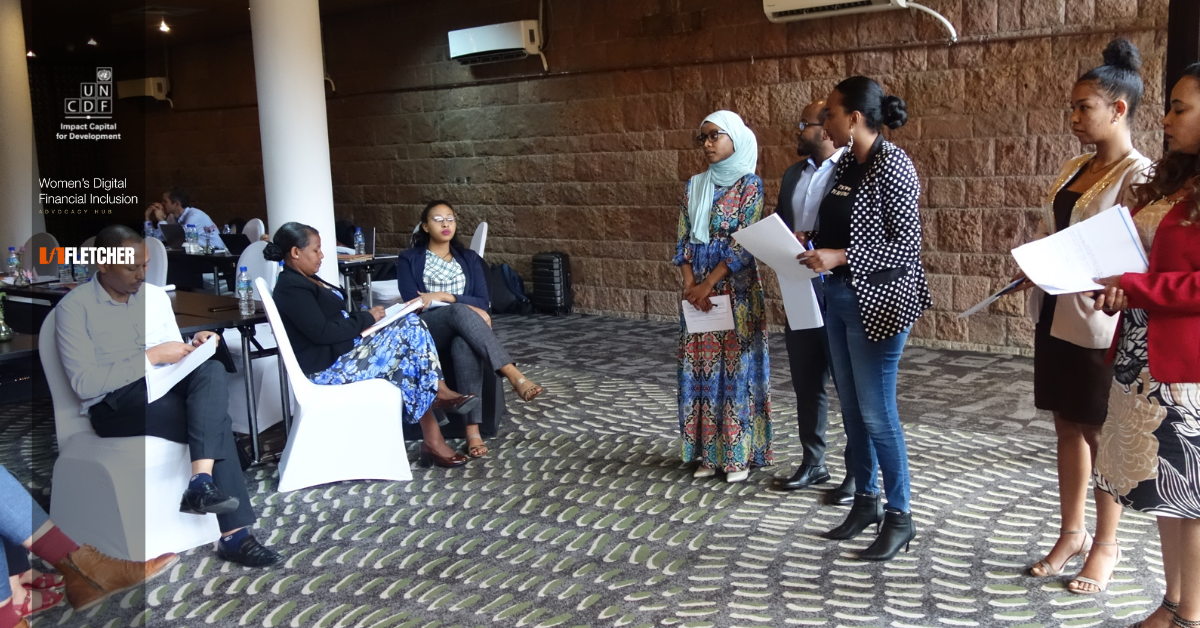

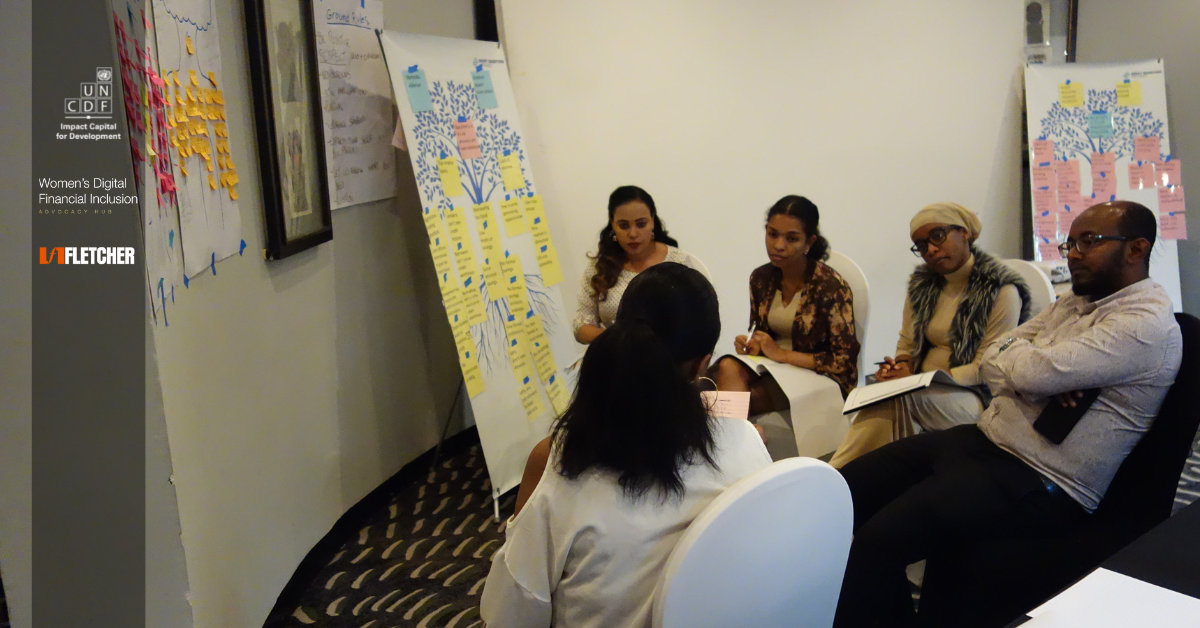
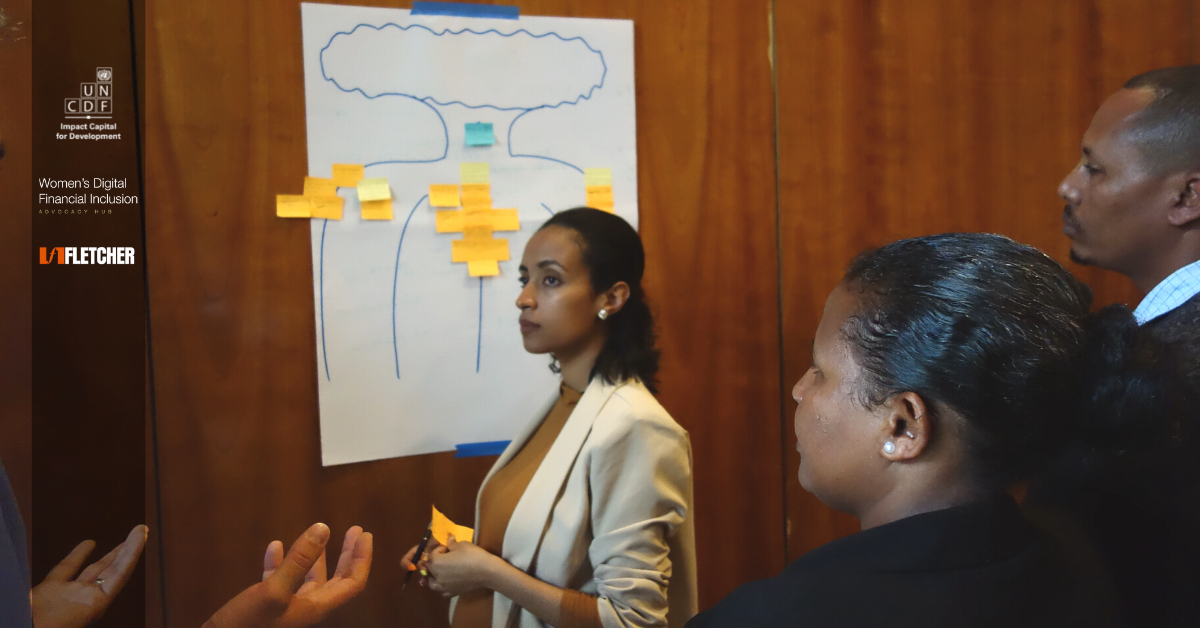
Local Advocacy Campaign
November, we launched the WDFI Digital Financial Literacy Campaign to test the legs of the WDFI Coalition as a powerful mechanism of stakeholder engagement and gender-intentional advocacy. The campaign raised awareness of the relevance of financial education in Ethiopia by collecting resources and examples of good practices that will be leveraged by the National Bank of Ethiopia (NBE) to support the implementation of the new National Financial Inclusion Strategy (NFIS). Assets were created in English and Amharic and disseminated through social media and non-traditional, but popular, local channels such as Telegram. In support of the campaign, Muhidin Shifa from the NBE shared their commitment to leverage the WDFI Advocacy Hub as the channel to engage diverse stakeholders to jointly implement the NFIS.
Amplifying voices and building a network of young advocates
To live up to our commitment to amplify the voices of young women, we worked with our global partners to ensure they could get visibility and recognition for their work to advance WDFI. Our partners, champions and friends featured as key speakers at:
• The 77th Session of the UN General Assembly
• Mobile World Congress Africa 2022
• The Internet Governance Forum 2022
• 15th Global Entrepreneurship Week
• Generation Equality newsletter
• Girl Rising newsletter
• The WDFI Advocacy Hub’s first webinar: The Gateway to Growth for Women Entrepreneurs & Businesses




In parallel to the Ethiopia Coalition, we also launched our Network of Champions to elevate the voice of young Ethiopian advocates (aged 18-30) working to advance women’s economic empowerment. We are working with young entrepreneurs, professionals and activists who are contributing their knowledge, experience, skills and ideas, and lending their voices to support our call for action around financial and digital inclusion in Ethiopia.
What’s coming next?
Going forward, UNCDF is ready to support members of the Ethiopia Coalition to implement the solutions they developed during the 8QM training. All members were invited to apply for funding, which was awarded based on the relevance of the proposal to advance WDFI, as well as the extent to which this was designed to be implemented in partnership with at least one other member of the Coalition.
In the coming months, UNCDF will provide technical assistance and work with the members to capture lessons learned and prepare these projects for scale.
Join us
The ‘Local to Global’ approach of the WDFI Advocacy Hub is reimagining how we work in concert to address a myriad of interrelated challenges, pivoting toward more connected and cross-cutting approaches to solving local problems.
Next year we will expand this work by inviting new members to be part of the Coalition, co-creating more advocacy campaigns, delivering more trainings, organising in-person events, and opening a second round of funding.
This is a call to action to those who want to be agents of change in the digital journey of their own country. Join us, join the conversation, join the movement.
#ItsHerEconomyToo






